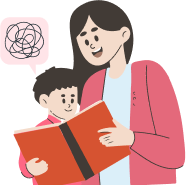Struggling with your child’s reading can be frustrating, especially when they can sound out words but don’t fully understand what they read. That’s why it’s crucial to know why oral language and vocabulary are the foundations for literacy.
A strong vocabulary and rich oral language help children make sense of sentences, understand new concepts, and express their thoughts clearly. Every conversation, story, and word game contributes to their ability to read and write with confidence.
By focusing on building these skills early, you give your child the tools to tackle challenging texts, enjoy reading, and succeed academically. In this blog, you'll discover how spoken language connects to reading success.
We'll explore the three key pillars that oral language builds for reading development. You'll also learn practical strategies to strengthen your child's vocabulary and language skills at home.
Key Takeaways
-
Oral language skills form the foundation for reading, writing, and overall literacy development.
-
A rich vocabulary enables children to comprehend texts, express their ideas, and form connections independently.
-
Daily conversations, storytelling, and word games naturally and consistently strengthen language skills.
-
Address common obstacles like limited time, screen distractions, and shy speakers with practical, low-pressure strategies.
-
Structured programs, such as FunFox, complement home learning and accelerate oral language and literacy development.
Why Oral Language is the Foundation for Literacy?

Oral language is the foundation for literacy because it gives children the skills they need to understand written text. Hearing words, sentences, and stories helps their brains connect sounds to letters. Without this base, reading and understanding written words is much harder. For example, a child who has never heard the word “magnificent” will struggle to understand it in a book, even if they can read the letters.
Strong oral language skills also help children develop their writing skills. Listening to stories and speaking in complete sentences teaches grammar and sentence structure. This makes it easier for children to organize their own writing and express ideas clearly. Studies show that children with rich oral language skills start school better prepared for reading and writing.
Children begin building this foundation in infancy and continue through the school years. Every conversation, story, or word game strengthens the brain connections that support reading and writing. Oral language is the foundation for literacy because it gives children the tools they need to decode words, understand text, and write confidently.
Also Read: How to Improve Your Child’s Reading Skills
How Does Oral Language Build the Pillars of Reading?
Oral language development creates three essential pillars that support reading success. These pillars work together to help children decode words, understand meaning, and read with fluency. Each pillar builds on the spoken language experiences your child has every day.
Let's explore how these fundamental pillars develop through oral language experiences and support your child's reading journey.
Phonological Awareness
Phonological awareness is the ability to hear and play with the sounds in spoken language. Children who notice rhymes, break words into syllables, and identify beginning sounds build a foundation that makes reading easier.
For example, understanding that “cat” has three distinct sounds helps children connect letters to sounds when they see them in print. Research shows that children with stronger phonological awareness tend to become better readers.
Ways to strengthen phonological awareness:
-
Sing songs with rhyming patterns.
-
Clap out syllables in words during daily routines.
-
Play sound games, such as asking “What sound does ball start with?”
-
Invite playful wordplay, rhymes, and conversations about sounds.
Vocabulary Development
A rich vocabulary is crucial for understanding what children read. Words heard in conversation form the base for reading comprehension. Children who are exposed to more words through speaking and listening can focus on understanding stories instead of struggling with word meanings.
Ways to strengthen vocabulary:
-
Have frequent, meaningful conversations with your child.
-
Introduce new words during daily activities and explain their meaning.
-
Use descriptive language when telling stories or giving instructions.
-
Prompt your child to use and discuss new words in conversation.
Syntax and Grammar
Understanding sentence structure helps children predict what comes next when reading. Listening to and speaking in complete sentences teaches grammar naturally.
This knowledge allows children to anticipate words and phrases, making reading smoother. Hearing varied sentence patterns also helps them understand more complex structures in books, strengthening comprehension and fluency.
Ways to strengthen syntax and grammar:
-
Have your child tell complete stories in full sentences.
-
Model varied sentence structures when speaking or reading aloud.
-
Discuss how sentences are constructed and why words are arranged in a specific order.
-
Play storytelling or sentence-building games focused on sentence flow.
Understanding the pillars of reading demonstrates the specific skills children need to succeed. Among these, vocabulary stands out as the gateway to comprehension and meaningful engagement with text.
Also Read: Kindergarten Reading Level Guide and Tips
What Role Does Vocabulary Play in Literacy Development?

Vocabulary knowledge acts as the gateway to reading comprehension. Children may read words correctly but miss the meaning entirely if they lack the right vocabulary.
These are the key roles vocabulary plays in literacy development:
-
Bridges reading fluency and comprehension, helping children understand the meaning behind the words they read.
-
Enables understanding of complex ideas as children progress to more advanced texts.
-
Strengthens oral language skills, exposing children to thousands of new words through conversation and listening.
-
Improves visualization and interpretation, enabling children to grasp images, ideas, and context in texts fully.
Consider this example: your child reads the sentence, "The azure sky stretched endlessly above the meadow," with perfect fluency. Without knowing words like azure or meadow, they miss the image the author intended. This highlights how vocabulary directly affects comprehension.
Daily conversations are a simple way to support vocabulary growth. Using descriptive language and introducing new words naturally prepares children for future reading success and helps close vocabulary gaps before they widen in later grades.
Also Read: Understanding Text and Reading Strategies
Knowing how vocabulary influences literacy makes it clear why intentional support matters. The next step is to explore practical strategies that parents and teachers can use to strengthen language skills every day.
What Can Parents and Teachers Do to Strengthen Oral Language and Vocabulary?
Building strong oral language and vocabulary requires intentional daily practices that feel natural and enjoyable. The most effective strategies integrate seamlessly into your existing routines while creating rich language opportunities for your child.
Here are proven methods to strengthen your child's oral language foundation and expand their vocabulary through everyday interactions.
Engage in Rich Daily Conversations
Use routine moments like meals, car rides, or bedtime to practice language naturally. Meaningful conversations help your child think, share ideas, and learn new words.
Try these strategies:
-
Ask open-ended questions, e.g., “What was the most interesting thing that happened at school today?”
-
Build on your child’s responses by adding details and new vocabulary, e.g., “A huge dog! Was it friendly or scary?”
-
Share your own experiences using rich language, describing your day and thought process out loud.
-
Listen actively and give your full attention, showing that their ideas matter and inviting longer, more detailed responses.
Consistent, thoughtful conversations turn routine moments into opportunities for language growth while strengthening your child’s confidence in expressing themselves.
Read Aloud Together Daily
Reading aloud gives your child exposure to words and language they won’t hear in everyday conversation. Books introduce new vocabulary and sentence structures in ways that make sense.
Here’s how to make the most of read-aloud time:
-
Choose books slightly above your child’s reading level to challenge vocabulary and comprehension.
-
Explain unfamiliar words and link them to your child’s own experiences.
-
Ask questions about the story and let your child predict what happens next.
-
Discuss characters’ feelings, problems, and solutions to strengthen comprehension and critical thinking.
-
Vary book choices with fiction, non-fiction, poetry, and informational texts to expand vocabulary in different contexts.
Create Storytelling Opportunities

Encourage your child to share stories about their experiences, dreams, or imaginary adventures. Storytelling builds narrative skills, boosts vocabulary, and strengthens confidence in speaking.
Try these strategies:
-
Invite your child to share stories about real-life events or create imaginative adventures.
-
Listen actively and ask follow-up questions to help them expand their ideas.
-
Play collaborative storytelling games by taking turns adding sentences to a story.
-
Use photos, pictures, or objects as prompts and ask your child to create stories about them.
-
Have your child retell favorite books or movies in their own words to practice comprehension and new vocabulary.
These simple activities make storytelling fun while helping your child grow language skills naturally.
Play Word Games and Language Activities
Turn daily routines into fun opportunities to build language skills. Word games make learning playful while helping your child use and remember new vocabulary.
Try these ideas:
-
Play “I Spy” with descriptive words to build vocabulary and observation skills, e.g., “I spy something magnificent and circular.”
-
Use rhyming games during car rides or while waiting, starting with simple rhymes and gradually increasing the complexity.
-
Play category games by naming animals, foods, or places, and take turns using more descriptive words like “golden retriever” instead of just “dog.”
-
Create silly sentences with new vocabulary words to make meanings memorable and make language fun.
These games will transform your everyday moments into engaging practices that strengthen vocabulary and language confidence.
Even with effective strategies, challenges can pop up. Tackling common obstacles helps language development stay on track and keeps children confident as they learn.
Also Read: How to Help Your Child Struggling with Writing Skills
Common Challenges and How to Overcome Them

Many parents face similar obstacles when trying to build their child's oral language and vocabulary skills. Understanding these common challenges helps you address them promptly and maintain consistent progress in your child's language development.
Challenge: Limited Time for Conversations
Modern family schedules often leave little room for extended talks. Between work, school activities, and daily responsibilities, it can feel impossible to prioritize language-rich interactions.
-
Solution: Look for small pockets of time in daily routines. Talk during car rides, mealtimes, or bedtime. Describe what you’re doing, ask for your child’s input, and involve them in tasks through conversation. These moments add up.
Challenge: Screen Time Competition
Digital devices can take over free time. Children may choose screens over talking, making it challenging to engage them in meaningful conversations.
-
Solution: Set specific times for device-free interactions. Pick topics your child is excited about and show genuine interest in their thoughts. Make conversations enjoyable so they become something your child looks forward to.
Challenge: Vocabulary Gap Concerns
Some parents worry their child is behind peers in vocabulary development. Comparing your child to others can create pressure and make language learning feel stressful rather than natural.
-
Solution: Focus on consistent, positive language experiences instead of comparisons. Every child develops at their own pace. Celebrate small improvements and provide daily exposure to new words to build vocabulary over time.
Challenge: Reluctant Speakers
Some children naturally speak less or feel shy expressing themselves verbally. Parents may struggle to get them to participate without adding pressure.
-
Solution: Create low-pressure opportunities for expression. Accept non-verbal communication as valid. Ask questions that allow short answers first, then gradually encourage longer responses. Show appreciation for any effort to communicate.
Addressing these challenges consistently helps your child grow confidence and language skills without stress. Small, daily conversations and interactive experiences can make a big difference over time.
How does FunFox support Oral Language and Literacy Skills?

FunFox recognizes that oral language forms the foundation for all literacy success. Both our Readers Club and Writers Club integrate speaking and listening activities throughout their structured curriculum, creating comprehensive language development opportunities.
FunFox Readers Club Benefits:
The Readers Club builds vocabulary through interactive text discussions and guided reading activities. Small group settings allow personalized attention to each child's specific language development needs.
Key features include:
-
Meaningful conversations about stories, characters, and themes.
-
Vocabulary expansion through guided reading discussions.
-
Oral prediction and connection-making activities.
Students practice explaining their thinking about texts, which strengthens both vocabulary usage and critical thinking abilities. This oral foundation directly supports the growth of reading comprehension.
FunFox Writers Club Advantages:
The Writers Club develops oral language through storytelling, writing, sharing, and collaborative discussions. Students practice expressing ideas verbally before writing them down, strengthening the vital connection between spoken and written language.
Program highlights:
-
Storytelling practice and creative idea sharing.
-
Peer feedback discussions about writing techniques.
-
Collaborative brainstorming for character and plot development.
-
Confidence-building through a supportive writing community.
Integration with Home Learning:
FunFox activities perfectly complement home language development efforts. Parents can extend their child's club experiences by discussing what they learned and encouraging them to share their stories and activities.
This combination of rich home conversations and structured FunFox instruction creates comprehensive language support. Together, these experiences help children build the strong oral language foundation necessary for continued literacy success throughout their educational journey.
Wrapping Up
Understanding that oral language and vocabulary are the foundations of literacy empowers you to support your child's learning from the very start. Every conversation, story, and playful word activity helps build the strong foundation your child needs for reading and writing success.
Children with rich oral language experiences become more confident readers and writers. By prioritizing daily conversations, reading together, and creating opportunities for your child to express themselves, you’re investing in their long-term academic growth.
FunFox supports this journey by providing structured opportunities for children to practice storytelling, word games, and interactive reading in a guided, engaging environment. Book a FunFox trial class today to give your child a head start in building strong language and literacy skills.
FAQ’s
1. What are the 5 foundations of literacy?
The five foundations of literacy are phonological awareness, phonics, vocabulary, fluency, and comprehension. Each builds essential skills that allow children to decode words, understand text, and read confidently.
2. What are the three tiers of vocabulary?
The three tiers of vocabulary are basic words used daily, academic words found in school and texts, and domain-specific words related to specific subjects or fields of study.
3. Is language the foundation of literacy?
Yes, language is the foundation of literacy. Listening, speaking, and understanding words prepare children to decode text, comprehend reading materials, and express their ideas through writing.
4. What are the basic foundations of learning?
Basic foundations of learning include language and communication skills, cognitive development, social-emotional skills, physical coordination, and curiosity. These support children’s ability to understand, explore, and interact with their environment.















